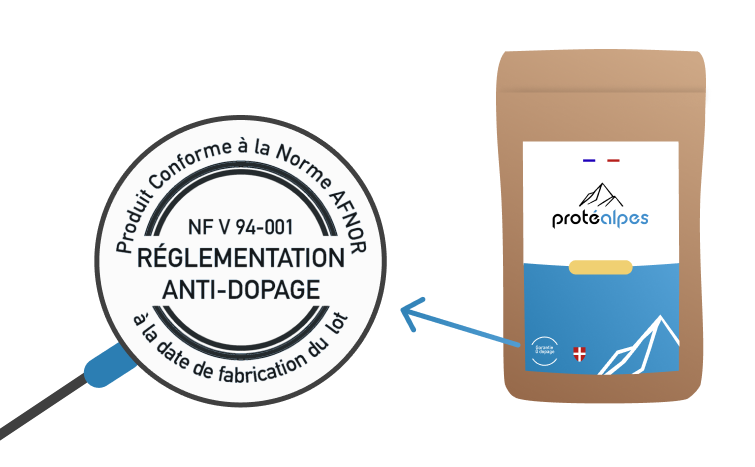Even outside of bodybuilding, it's difficult to make progress without a sufficient protein intake. This is why many athletes consume whey protein in sachets or jars. However, in addition to the various side effects attributed to whey, many athletes associate these products with doping.
Is there any truth to this belief? Can taking whey ruin your efforts in a sporting competition? We propose to answer these questions on this page, and to establish a link between diet and muscle mass gain.
In short, although whey is sometimes confused with doping, it has no doping effect on the body.

Contents
What is whey?
Contrary to popular belief, whey is indeed a dietary supplement, but it is a substance of natural origin. This whitish powder corresponds to filtered, dehydrated milk, freed of lactose, lipids and casein.
This product is made from whey, a protein-rich substance that is easily assimilated by the body. These qualities make it the most widely consumed protein powder, ahead of casein, which is much slower to digest.

Whey contains branched-chain amino acids (BCAAs) and essential amino acids (EAAs). In particular, it provides the body with leucine, isoleucine and valine, substances which the body is unable to synthesize.
With this composition, 100 g of whey protein contains more EAA and BCAA than 100 g of salmon or egg protein. It remains the most affordable solution for effective sports nutrition and supplementation. This product can therefore be included in the diet of occasional athletes, high-level athletes and, of course, bodybuilding enthusiasts.
Is whey a doping risk?
Well, well, well! The International Olympic Committee has already looked into the matter. In 2004, it financed a study led by the University of Cologne. The study analyzed the composition of several food supplements from 13 different countries.
The study showed that almost 15% of these dietary supplements for athletes were doping products, including protein powders. These products contained traces of growth hormones and anabolic steroids.

But how can we explain the presence of these doping substances? It would seem that contamination is linked to the manufacturing process of the finished product. The giants of sports nutrition use the same plant to produce and package all their products.
Lacking the time or personnel to carry out thorough cleaning and control, producers are unable to rid themselves of doping substances. They end up on the production line and in the whey.
In fact, the whey you find on the virtual shelves of an online store, on Amazon, or in a parapharmacy is not made entirely from whey. Their composition includes numerous additives to improve taste or facilitate digestion. These additions are likely to increase the risk of exposure to doping products.
How can you reduce the risk of doping when choosing your whey?
The world of sport is well aware of the link between dairy-based dietary supplements and doping product contamination. That's why, for example, the French Standards Association (Afnor) has drawn up the anti-doping standard NF V 94-001 aimed at preventing contamination with doping products.
It provides French companies with best practices for reducing the risk of contamination with any doping substance. It is also aimed at producers of whey and other protein powders for athletes.

Products committed to this policy, free of any doping substances, are labelled "le produit est conforme à la date de libération du lot, à la norme AFNOR NF V 94-001".
In the first instance, therefore, you should give preference to protein powders displaying this phrase on their packaging. For whey produced outside France, other countries have taken similar initiatives. The Cologne List® label, the result of the study mentioned above, brings together food supplements free from doping products.
The presence of the label should reassure athletes who wish to acquire a quality dietary supplement that is better for their health and effective for weight gain.

Products complying with the Afnor anti-doping standard or belonging to this label do not necessarily cost more. A quality whey will not necessarily command a higher price. In the absence of a reassuring statement or label, athletes can also rely on the list of ingredients.
To minimize the risk of doping, it's best to avoid dietary supplements with long lists of ingredients and additives. What's more, prefer protein powder produced in France. These tips will already minimize the risk of doping and avoid disrupting the body's functions.
Does eating protein powder mean doping?
For some athletes and body-builders, the question is not so much whether dietary supplements, the fear of whey side-effects or any other product contain doping substances or not. For them, taking whey protein, and more generally supplementation, is a form of doping, since the nutrients absorbed improve performance. But this argument doesn't hold water.
Raw whey corresponds to filtered and dehydrated milk, freed of lactose, lipids and casein. It is of natural origin and undergoes no particular processing or "enrichment". What's more, this milk protein does not directly add muscle mass. It simply enhances muscle recovery and enables optimal exercise.
Your training sessions remain at the heart of your progress. Physical effort initiates the process, enabling muscle catabolism and anabolism. Whey's high bioavailability enables it to supply the body with essential amino acids rapidly. As a result, the body is able to cope with exertion, recover more quickly and deliver protein for optimal muscle mass gain. To find out more about taking protein supplements, see our short explanation on how and why to take whey.
How can I find good quality whey protein?
Finding a dietary supplement that complies with the AFNOR anti-doping standard is no mean feat, and opting for a low-cost whey brand exposes you even more to the risks mentioned... However, with the explosion of the sports nutrition market, producers are under the watchful eye of various structures. It is in their interest to carry out meticulous quality control in order to continue marketing their products.
As a priority, look for brands that communicate and are transparent about their manufacturing methods. Rely on internet reviews: the comments left here and there will help you identify the dietary supplement that's right for you.
But choosing a whey protein is also a question of price, quality and delivery. If we had to give you any advice, it would be to take a very close look at the product's composition. Avoid long lists of ingredients and additives.

Choose a protein powder with a delicious, natural flavor. You'll be able to take it with you practically every day, at your own pace and with the frequency of your workouts. Chocolate and/or vanilla flavours are very popular with bodybuilding enthusiasts. Don't hesitate to give it a try if you practice another sport.
To find out more: see our article on organic whey and :
- Does whey make you fat?
- Is whey dangerous for the heart?
- Whey and weight loss: what does science have to say?
- Which whey should you choose if you're a beginner?
- How to choose your whey?
- How many whey shakers per day?
- How do you incorporate whey into your physical preparation?
- Our pharmacists' opinion on native whey




















